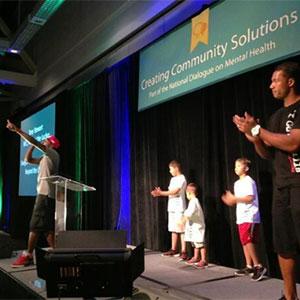
Libraries across the country are invited to join a national conversation about mental health over the coming months. These dialogues will bring people together at large forums, in small-group discussions, in city-wide deliberations, and online. Launched at the White House in early June, this Creating Community Solutions conversation intends to increase understanding and awareness about mental health, with a particular focus on young people.
The American Library Association Center for Civic Life is partnering on this initiative with numerous other civic groups led by America Speaks, the National Institute for Civil Discourse (NICD), the National Issues Forums Institute (NIFI), the National Coalition for Dialogue and Deliberation (NCDD), Everyday Democracy, and the Deliberative Democracy Consortium (DDC).
According to the Creating Community Solutions partnership:
Mental health problems affect nearly every family. Yet as a nation, we have too often struggled to have an open and honest conversation about these issues. Misperceptions, fears of social consequences, discomfort associated with talking about these issues with others, and discrimination all tend to keep people silent. Meanwhile, if they get help, most people with mental illnesses can and do recover and lead happy, productive, and full lives.
The Creating Community Conversation public engagement partners have developed a number of tools to help individuals and organizations plan and convene mental health community conversations. These tools can help get the public talking about mental health concerns, find innovative solutions; and develop steps for communities to address local needs. Included in the Toolkit are
- an Information Brief in English (PDF) and Spanish (PDF) that includes background about mental health
- a discussion guide (PDF) for use by those convening community conversations
- a planning guide (PDF) that describes ways for people to conduct conversations and take steps to raise awareness and make a difference in their communities.
The Creating Community Solutions website offers many other tools to help organizations engage the public in these conversations. Among the most useful resources is the map of local initiatives already underway, such as the dialogue planned for Mental Illness Awareness Week at the Alexandria (VA.) Public Library and the Kansas Town Hall at the Eisenhower Presidential Library. Communication tools are also provided, including the Civic Commons online discussion forum, social media resources, and videos of events and news coverage. In addition, links are available to potential partners, publicity and coordination assistance for local events, training webinars, and a portal for communities to upload the results of their events.
One example of an outcome from an event already held is the posting from a day-long convening sponsored by the mayor of Sacramento, California, that demonstrates the value of these conversations—one that offered 350 people an opportunity to learn about mental health and recommend priority strategies and actions to improve the lives of those living with mental health issues. Videos telling stories around that event are also posted.
Working in tandem with Creating Community Solutions is the U.S. Department of Health and Human Services, Substance Abuse and Mental Health Services Administration (SAMHSA), which has produced a consumer-oriented website to facilitate dialogue, help people seeking information about the signs of mental illness, and offer help. SAMHSA offers guidance for veterans and their families, a treatment locator, assistance for youth, emergency links, myths and facts, and other tools along with Youtube videos that feature young people sharing stories about their own mental health challenges and recovery.
Creating Community Solutions suggests an array of different ways that organizations and the public can participate in mental health dialogues, such as.
- Community-wide planning efforts that could include large-scale deliberative events where local leaders and hundreds of people help produce action plan.
- Smaller dialogues that allow six to ten people to share experiences and build connections.
- Moderated online conversations that connect people across the country amd focus on particular topics and actions.
What you can do:
- Help spread the word about the initiative in your networks and through social media.
- Step forward to organize a mental health event.
- Host an event at your library.
- Help recruit participants.
- Volunteer as a facilitator.
- Participate yourself in one of the community conversations.
Resources to help your organization or community facilitate conversations, share information and encourage participation are available. To learn more about plans and upcoming conversations as well as find public engagement practitioners who can help organize and plan an event in your community, click on a pin on the project geo map. For more information about this initiative, contact Nancy Kranich at nancy.kranich@rutgers.edu, or visit the Center for Civic Life’s blog.

